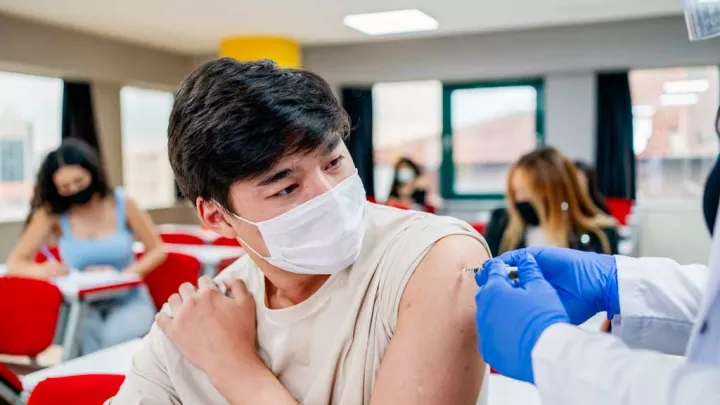Extracorporeal Membrane Oxygenation (ECMO) Program
Children’s Hospital Los Angeles is a leader in the most innovative treatments for critically ill children and young adults. Our Extracorporeal Membrane Oxygenation (ECMO) Program provides 24/7, state-of-the-art care for children who need advanced lung and heart support.
The pediatric ECMO Program at Children’s Hospital is the largest in California, and among the first in the state. Since 1987, we have used ECMO to give more than 1,400 critically ill babies and children the best chance of survival. Our specialists treat more patients and have more experience than pediatric ECMO specialists at other hospitals in Southern California.
What Is ECMO Treatment?
ECMO treatment is a type of intensive lung or heart-lung support, used to treat life-threatening conditions when other options haven’t worked. The ECMO machine (also called an ECMO circuit) adds oxygen to and removes carbon dioxide from your child’s blood.
To begin ECMO treatment, a doctor inserts tubes called cannulas into your child’s large blood vessels. The cannulas allow blood to circulate out of your child’s body, through the ECMO circuit (where it receives oxygen) and back into your child’s body. If your child’s heart also needs support, the ECMO machine pumps the oxygenated blood throughout the body.
Your child may receive ECMO treatment for days or weeks. ECMO can give the body time to heal or act as a bridge until another treatment, such as a heart transplant, is available. Learn more about ECMO.
Pediatric ECMO Treatment: Why Choose Us
Our ECMO Program is unparalleled in the Southern California region. We have decades of experience providing lifesaving ECMO treatment for even the smallest patients.
Children and young adults who receive ECMO treatment at CHLA benefit from:
- 24/7 specialized care: ECMO is an emergency treatment, so minutes matter. Our in-house ECMO team sets us apart—specialists are here day or night to place children on ECMO. Your child receives personalized, round-the-clock care from a critical care nurse and an ECMO specialist.
- World-class treatment: We are a Designated Gold Level Center of Excellence for ECMO treatment. The Extracorporeal Life Support Organization (ELSO) gives this designation to programs that offer excellence in patient care, patient safety and staff education.
- Leading-edge technology: Thanks to a large investment in upgraded equipment, our ECMO treatment is now safer than ever. We are among the first children’s hospitals in the country to use centrifugal ECMO machines with advanced artificial intelligence. These machines let us fine-tune ventilation to optimize blood flow to the brain and track blood thickness to reduce clots.
- Expert team: Our team includes specially trained registered nurses and respiratory therapists with extensive experience in critical care and ECMO. Because we treat so many patients, our ECMO specialists have three times the recommended minimum number of hours per year managing ECMO circuits.
- Family engagement: From ECMO education to holistic care, we’re here to support your family. While the ECMO machines require expert management, we help you find ways to participate in your child’s care. ECMO patients often require transfusions, so we encourage family members to donate blood. And our Family Resource Center offers education on how to care for children after they come off of ECMO.
- Commitment to innovation: We believe that the only way to continually improve patient care is to share our knowledge and experiences with other ECMO programs. Our program leaders regularly present our innovative and successful protocols at ECMO conferences. We also work with other hospitals on multicenter clinical trials to reduce ECMO complications.
About Our ECMO Program
Our ECMO Program is a standalone department that provides care in all three CHLA intensive care units: the Thomas and Dorothy Leavey Foundation Cardiothoracic Intensive Care Unit (CTICU), Steven & Alexandra Cohen Foundation Newborn and Infant Critical Care Unit (NICCU) and Ahmanson Foundation Pediatric Intensive Care Unit. We have capacity to care for five ECMO patients at a time across these three units.
We also keep ECMO on standby for some high-risk procedures in the operating rooms (OR), Cardiac Catherization Lab and Emergency Department (ED). The ICUs, OR and ED may use ECMO for patients who don’t respond to traditional CPR. This novel use of ECMO is called extracorporeal cardiopulmonary resuscitation (ECPR).
Conditions we may use ECMO to treat
ECMO was initially used for infants, but we now use it to treat patients of all ages, from newborns to young adults. ECMO may help patients with severe cases of:
- Acute respiratory distress syndrome (ARDS)
- Alveolar capillary dysplasia (ACD)
- Cardiogenic shock
- Cardiomyopathy
- Cardiovascular collapse in hematology-oncology patients
- Congenital diaphragmatic hernia
- Congenital heart defects
- Meconium aspiration
- Multisystem inflammatory syndrome in children (MIS-C)
- Myocarditis
- Respiratory failure
- Sepsis
ECMO Program Team
Having a dedicated ECMO team allows us to provide the best possible care for your child. Benefits of our team structure include:
- Highly experienced staff: Each of our ECMO specialists spends 350 - 500 hours per year managing ECMO machines. This level of experience is three times ELSO’s recommended hours per year to maintain ECMO competency.
- Frequent, comprehensive training: Our robust in-house education program keeps us at the leading edge of ECMO care. New team members must complete our 5-day ECMO Specialist course, including simulations and team-building exercises, along with a minimum of 120 mentored hours. All team members have ongoing training to keep up with the latest ECMO technology and best practices. We provide quarterly education sessions, hands-on simulations and journal clubs to review the latest ECMO literature.
- Improved patient safety outcomes: As a centralized department, we standardize protocols across all three ICUs to maximize patient safety. We have monthly case reviews to discuss complications and improve care.
ECMO specialists
Our specialists are registered nurses or respiratory therapists who have completed our ECMO Specialist course. They have a minimum of three years’ experience in intensive care and a national specialty certification, such as critical care nursing (CCRN) or neonatal intensive care nursing (RNC-NIC).
We have a designated primer — a specialist trained to prime (prepare) the ECMO circuit and place a child on the machine — on every shift. Many hospitals rely on perfusionists, who specialize in managing all types of heart-lung machines, to set up a new ECMO circuit. Because we have a primer in-house 24/7, we don’t need to wait for a perfusion team. An ECMO specialist remains with your child throughout treatment to monitor and manage the machine.
ICU consulting doctors
Your child’s ECMO care is guided by a team of intensive care doctors from the CTICU, NICCU and PICU. These critical care experts attend the ECMO Program’s educational sessions to keep up with ECMO best practices.
The consulting doctors provide care continuity between the ICU and the ECMO team. Their expertise helps determine which patients should receive ECMO treatment and how to manage care for patients on ECMO.
Collaborating specialties
The ECMO team works closely with many other clinical departments throughout the hospital. Your child receives all the care they need from a multidisciplinary team of experts. Clinical areas we frequently work with include:
- Cardiology
- Cardiothoracic Surgery
- Cardiac Critical Care Medicine
- General Pediatric Surgery
- Neonatology
- Perfusion
- Physical therapy
- Radiology
Child Life and family support specialists
For older children, receiving ECMO can be challenging. Children’s Hospital provides age-appropriate care that takes your child’s social and emotional needs into account.
Some children receive medication to remain sedated during ECMO treatment, while others may be awake. Our Child Life specialists offer safe play activities and entertainment opportunities for awake children. They’re also available to answer your child’s questions about treatment and offer support and coping strategies.
We understand that having a child in the ICU can be difficult for your whole family. Our Social Work and Spiritual Care teams are here to support you in any way you need. The Family Resource Center is available to help you learn more about your child’s treatment and connect with resources.
Awards and Recognition
Children’s Hospital Los Angeles consistently receives the Extracorporeal Life Support Organization (ELSO) Award for Excellence in Life Support. This award recognizes our outstanding patient care, commitment to evidence-based protocols and exceptional team education.
ELSO is an international nonprofit consortium dedicated to developing and improving ECMO treatment. We are among just over 100 hospitals worldwide to achieve ELSO designation as a Gold Level Center of Excellence.
Additional awards
- Beacon Award for Excellence: Our Cardiovascular Acute Unit, CTICU and PICU have received the Beacon Award from the American Association of Critical Care Nurses. This award recognizes our high-quality care, positive outcomes and exceptional patient experience.
- Nationally ranked heart care: U.S. News & World Report ranks us among the best in the country for cardiology and heart surgery care. The same report lists CHLA as one of the top 10 children’s hospitals in the nation.
Exceptional Critical Care at Children’s Hospital Los Angeles
Our intensive care units provide comprehensive care and intensive monitoring for patients with life-threatening conditions. Our collaborative approach ensures your child receives all the expert care they need. Learn more about Critical Care Medicine at Children’s Hospital.


